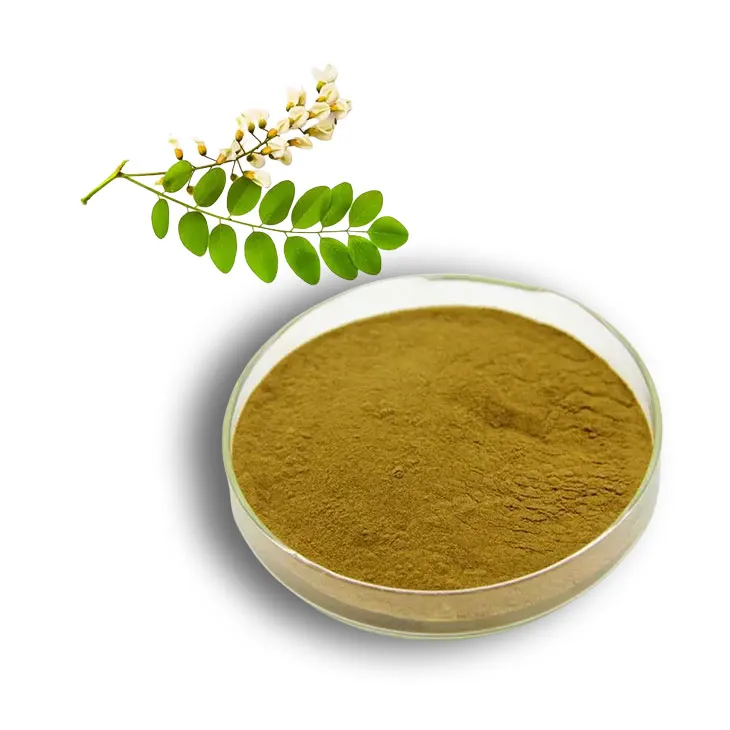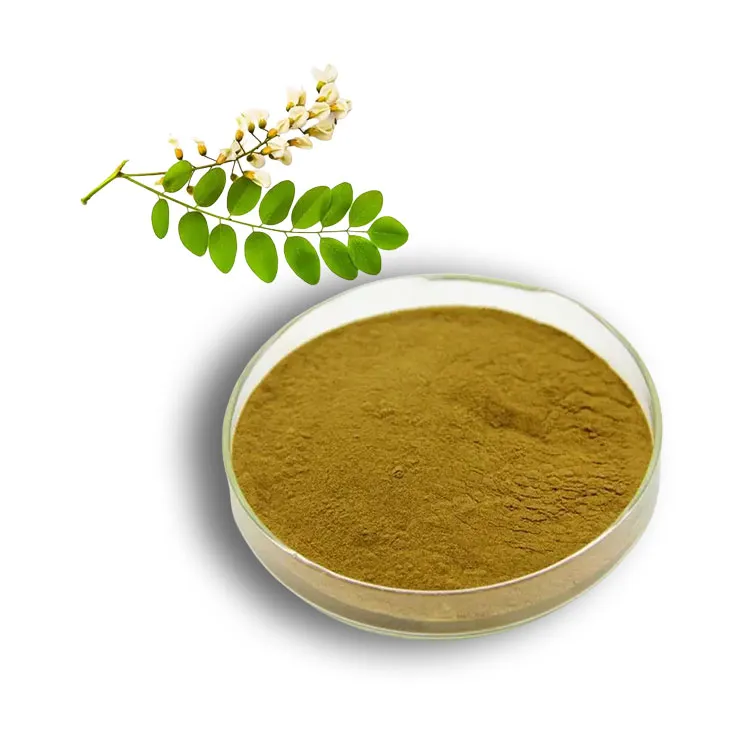- 0086-571-85302990
- sales@greenskybio.com
Components of fertilizer and feed in sophora japonica flower extract.
2024-11-26

1. Introduction
The Sophora japonica is a plant with a wide range of potential applications. Its extract contains various components that can be valuable for both the fertilizer and feed industries. In this article, we will explore these components in detail and understand how they can play important roles in improving soil fertility, promoting plant growth as fertilizer, and enhancing the nutritional value and digestibility of feed for livestock.

2. Components of Sophora japonica Extract for Fertilizer
2.1. Organic Matter
The extract of Sophora japonica contains a significant amount of organic matter. Organic matter is crucial for soil fertility. It improves soil structure, making the soil more porous and allowing better air and water circulation. This, in turn, is beneficial for the growth of plant roots. For example, the roots can easily penetrate the soil and access nutrients and water more efficiently. Moreover, organic matter acts as a reservoir for nutrients. It can hold onto essential nutrients such as nitrogen, phosphorus, and potassium, preventing them from being washed away easily by rain or irrigation water. As the organic matter decomposes slowly over time, it releases these nutrients gradually, providing a continuous supply for plant growth.
2.2. Nitrogen - containing Compounds
Nitrogen is one of the most important nutrients for plants. In Sophora japonica extract, there are nitrogen - containing compounds. These can be in the form of amino acids, proteins, or other nitrogenous substances. When these compounds are added to the soil as part of the fertilizer, they can be directly or indirectly taken up by plants. Direct uptake occurs when plants absorb the small - molecular - weight nitrogen - containing compounds such as amino acids through their roots. Indirect uptake happens when soil microorganisms break down the larger nitrogen - containing molecules into forms that plants can easily absorb, like ammonium or nitrate ions. The presence of these nitrogen - containing compounds in the extract helps in promoting the growth of leaves, stems, and overall plant vigor.
2.3. Phosphorus - related Substances
Phosphorus is essential for many plant processes, including energy transfer and root development. Sophora japonica extract may contain phosphorus - related substances. These substances can increase the availability of phosphorus in the soil. Some of them may chelate with phosphorus, preventing it from being fixed in the soil in forms that are not accessible to plants. For instance, in alkaline soils, phosphorus can react with calcium and become insoluble. The phosphorus - related substances in the extract can prevent this reaction, making more phosphorus available for plant uptake. This is crucial for plants as it helps in the formation of strong roots, which are necessary for anchoring the plant in the soil and for efficient nutrient and water absorption.
2.4. Potassium - like Components
Potassium is involved in various physiological functions of plants, such as regulating water balance and enhancing disease resistance. The Sophora japonica extract might have components that are similar to potassium in their function. These components can contribute to maintaining the proper osmotic balance within plant cells. They also play a role in activating certain enzymes in plants. For example, potassium - like components can help in the process of photosynthesis by activating enzymes involved in carbon dioxide fixation. By improving the function of these enzymes, plants can produce more carbohydrates, which are essential for growth and development.

3. How Sophora japonica Extract Components Promote Plant Growth as Fertilizer
3.1. Stimulating Root Growth
The combined action of the different components in Sophora japonica extract has a positive impact on root growth. The organic matter improves the soil structure around the roots, allowing for better root elongation. The nitrogen - containing compounds support the synthesis of proteins in the roots, which are essential for cell division and growth. Phosphorus - related substances promote the development of a strong root system, while potassium - like components help in maintaining the proper functioning of root cells. All these factors together result in a more extensive and healthy root system. A well - developed root system is able to explore a larger volume of soil, thereby increasing the plant's access to water and nutrients.
3.2. Enhancing Shoot Growth
Once the roots are well - established, the components of Sophora japonica extract also contribute to shoot growth. The nitrogen from the extract is used in the synthesis of chlorophyll, which is necessary for photosynthesis. With more chlorophyll, plants can capture more sunlight and convert it into chemical energy. This leads to increased production of carbohydrates, which are used for the growth of stems, leaves, and flowers. The phosphorus - related substances are involved in the transfer of energy within the plant, which is crucial for the growth and development of shoots. Potassium - like components help in maintaining the turgor pressure in plant cells, which is important for the proper expansion of leaves and stems.
3.3. Improving Plant Resistance
The components in Sophora japonica extract can also enhance the plant's resistance to various stresses. The organic matter in the extract can improve the soil microbial community. A diverse and healthy soil microbial community can help plants in fighting against soil - borne diseases. The potassium - like components play a role in strengthening the cell walls of plants, making them more resistant to pathogen attacks. Also, the balanced supply of nutrients from the extract, including nitrogen, phosphorus, and potassium - like substances, helps plants to be in a better physiological state, enabling them to better withstand environmental stresses such as drought, heat, or cold.

4. Components of Sophora japonica Extract for Feed
4.1. Protein and Amino Acids
The Sophora japonica extract can be a source of protein and amino acids for livestock feed. Proteins are made up of amino acids, and these are essential for the growth, development, and maintenance of animals. The amino acids in the extract can supplement the dietary requirements of livestock. For example, lysine, methionine, and tryptophan are some of the essential amino acids that animals need but may not be present in sufficient amounts in their regular feed. The presence of these amino acids in the Sophora japonica extract can improve the quality of the feed and ensure proper growth and development of livestock.
4.2. Vitamins and Minerals
The extract may also contain vitamins and minerals that are beneficial for livestock. Vitamins play important roles in various physiological processes in animals, such as metabolism, immune function, and reproduction. For example, vitamin A is important for vision and immune function, while vitamin E is an antioxidant that helps protect cells from damage. Minerals like calcium, phosphorus, and iron are also crucial for the proper development of bones, teeth, and blood in animals. The presence of these vitamins and minerals in the Sophora japonica extract can enhance the nutritional value of the feed, reducing the need for additional supplementation.
4.3. Bioactive Compounds
There may be bioactive compounds in the Sophora japonica extract. These compounds can have positive effects on the health of livestock. For example, some bioactive compounds may have antioxidant properties, which can help reduce oxidative stress in animals. Others may have anti - inflammatory properties, which can be beneficial for animals suffering from inflammatory conditions. These bioactive compounds can also improve the digestibility of the feed by interacting with the digestive enzymes in the animal's gut.
5. How Sophora japonica Extract Components Enhance Feed Quality
5.1. Increasing Nutritional Value
As mentioned before, the protein, amino acids, vitamins, and minerals in the Sophora japonica extract contribute to increasing the nutritional value of the feed. By adding the extract to the feed, farmers can ensure that their livestock receive a more balanced diet. This can lead to better growth rates, improved milk or meat production, and overall better health of the animals. For example, in dairy cows, a more balanced diet can result in increased milk yield and better milk quality.
5.2. Improving Digestibility
The bioactive compounds in the Sophora japonica extract can play a role in improving the digestibility of the feed. They can interact with the digestive enzymes in the animal's gut, either enhancing the activity of existing enzymes or providing additional enzymatic activity. This helps in breaking down the feed more efficiently, allowing the animals to extract more nutrients from it. Improved digestibility also means less waste, as more of the feed is digested and absorbed by the animals.
6. Conclusion
The Sophora japonica extract contains a variety of components that are valuable for both fertilizer and feed applications. For fertilizer, its components can improve soil fertility, promote plant growth, and enhance plant resistance. For feed, it can increase the nutritional value, improve digestibility, and have positive effects on the health of livestock. However, further research is still needed to fully understand the potential of these components and to optimize their use in agricultural and animal husbandry industries. With continued research and development, the use of Sophora japonica extract in these industries could bring significant benefits, including more sustainable farming practices and improved animal production.
FAQ:
What are the main components in Sophora Japonica Flower Extract for fertilizer use?
The Sophora Japonica Flower Extract for fertilizer use may contain various components such as nitrogen - containing compounds, phosphorus - related substances, and some organic acids. Nitrogen - containing compounds can provide essential nitrogen for plant growth, which is crucial for the synthesis of proteins and chlorophyll. Phosphorus - related substances play important roles in energy transfer and root development. Organic acids can help in nutrient absorption and soil structure improvement.
How do the components of Sophora Japonica Flower Extract enhance soil fertility?
The components in Sophora japonica flower extract can enhance soil fertility in multiple ways. For example, certain organic matter in the extract can improve soil structure by increasing soil aggregation, which allows for better air and water permeability in the soil. The presence of nutrients like nitrogen, phosphorus, and potassium can directly supply essential elements for soil microorganisms and plants. Additionally, some bioactive substances in the extract may stimulate the growth and activity of beneficial soil microorganisms, which in turn contribute to nutrient cycling and soil health.
What benefits can the Sophora japonica flower extract bring to plant growth as a fertilizer?
As a fertilizer, Sophora japonica flower extract can promote plant growth in several aspects. Firstly, it provides necessary nutrients that plants need for growth, such as those mentioned above. Secondly, it may enhance plant resistance to diseases and pests. The bioactive compounds in the extract can stimulate the plant's immune system, making it more resistant to external threats. Moreover, it can improve the efficiency of photosynthesis in plants. Some substances in the extract may influence the function of chlorophyll or other components related to photosynthesis, leading to increased production of carbohydrates and better plant growth.
How can the components of Sophora japonica flower extract improve the nutritional value of feed for livestock?
The components in Sophora japonica flower extract can improve the nutritional value of livestock feed. It may contain certain vitamins, minerals, and amino acids that are beneficial for livestock. For example, some unique amino acids can contribute to the growth and development of livestock, enhancing muscle growth and overall health. The presence of vitamins can also meet the nutritional requirements of livestock, and minerals can play important roles in bone formation, enzyme function, etc. Additionally, some bioactive substances may improve the digestibility of feed, allowing livestock to better absorb nutrients from the feed.
What is the role of Sophora japonica flower extract components in enhancing the digestibility of feed?
The components of Sophora japonica flower extract can enhance the digestibility of feed in different ways. Some substances may act as prebiotics, promoting the growth of beneficial gut microorganisms in livestock. These microorganisms can break down complex carbohydrates, proteins, and fats in the feed, making them more accessible for absorption. Other components may directly affect the digestive enzymes in the livestock's digestive tract, enhancing their activity and thus improving the digestion process. For example, certain compounds can stimulate the secretion or function of proteases, amylases, or lipases.
Related literature
- Analysis of Nutritional Components in Sophora japonica Extract for Feed Application"
- "The Role of Sophora japonica Extract in Soil Fertility Improvement"
- "Beneficial Components of Sophora japonica Flower Extract for Plant Growth"
- ▶ Hesperidin
- ▶ Citrus Bioflavonoids
- ▶ Plant Extract
- ▶ lycopene
- ▶ Diosmin
- ▶ Grape seed extract
- ▶ Sea buckthorn Juice Powder
- ▶ Fruit Juice Powder
- ▶ Hops Extract
- ▶ Artichoke Extract
- ▶ Mushroom extract
- ▶ Astaxanthin
- ▶ Green Tea Extract
- ▶ Curcumin
- ▶ Horse Chestnut Extract
- ▶ Other Product
- ▶ Boswellia Serrata Extract
- ▶ Resveratrol
- ▶ Marigold Extract
- ▶ Grape Leaf Extract
- ▶ New Product
- ▶ Aminolevulinic acid
- ▶ Cranberry Extract
- ▶ Red Yeast Rice
- ▶ Red Wine Extract
-
Cat Claw Extract
2024-11-26
-
Maitake Mushroom Extract
2024-11-26
-
Citrus Aurantium Extract
2024-11-26
-
Shikonin
2024-11-26
-
Acai Berry Extract
2024-11-26
-
Acerola Juice Powder
2024-11-26
-
Saw Palmetto Extract
2024-11-26
-
Curcuma Longa Extract/Turmeric extract
2024-11-26
-
Red Date Extract
2024-11-26
-
Eyebright Extract
2024-11-26





















